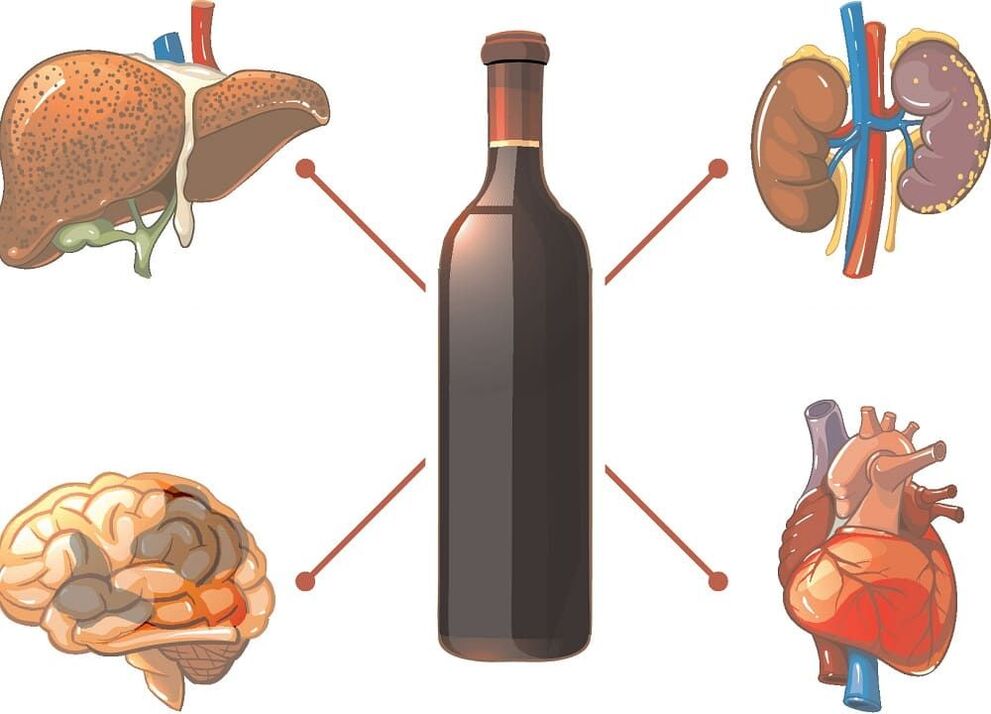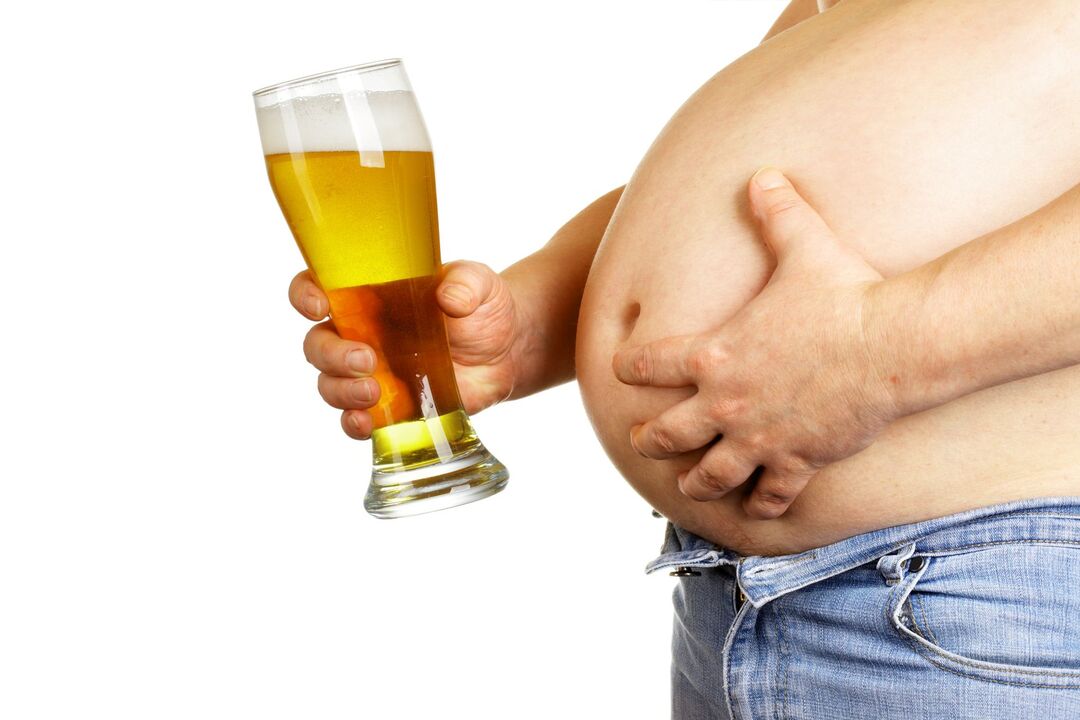Alcohol is one of the leading causes of death in the world. Today, its use is truly epidemic and leads to many serious consequences.
Many alcoholics drink large amounts of alcohol every day and experience negative consequences for their health. Therefore, the question of how long an alcoholic lives becomes especially relevant.
In this article, we will attempt to explore this topic based on scientific research and the experiences of practitioners. We will try to give a realistic picture of the impact of alcohol consumption on longevity and what to do to increase your chances of living a long life.
Why is drinking alcohol harmful to health?
Alcohol destroys cells and the body
Alcohol is harmful to health because it destroys the body's cells and tissues. Regular alcohol consumption leads to diseases of the liver, cardiovascular system, stomach and other organs. In addition, alcohol weakens the immune system and slows down the body's metabolism.
Alcohol impairs mental and physical health
Alcohol is harmful to health because it can cause poor attention, memory and thinking. Alcohol can also cause dizziness, cramps, and headaches or body aches. Drinking alcohol regularly can lead to a depressed emotional state, which can cause pain and suffering for yourself and your loved ones.
Alcohol can be addictive

Alcoholism is one of the most serious consequences of drinking alcohol. Regular alcohol consumption can lead to psychological and physical dependence, which can lead to serious social and health consequences. People with alcoholism experience difficulties in their personal, family, and professional lives, and may also be prone to lawbreaking and aggressive behavior.
Result:
Alcohol is harmful to health. Regular drinking can lead to serious physical and mental health consequences, as well as addiction and social problems. Therefore, it is important to take care of your health and drink alcoholic beverages in moderation or give up completely.
How does alcohol affect the body?
Alcohol has a multifaceted effect on the human body, completely covering all its systems and organs. It causes disruption of the nervous, cardiovascular, endocrine, digestive and other systems, which can ultimately lead to various diseases and serious consequences for the body.
Alcohol has a toxic effect on the nervous system, manifested in the form of impaired coordination of movements, irritability, emotional instability, memory loss and reduced ability to concentrate. In addition, it also has a negative impact on the cardiovascular system, causing increased blood pressure, arrhythmia and increased cholesterol levels in the blood.
Alcohol also has a negative impact on the digestive system, causing liver, pancreas and stomach problems. It can lead to the development of diseases such as gastritis, pancreatitis and cirrhosis.
It is important to note that drinking alcohol can lead to addiction. Alcoholics often feel the need to drink alcohol and cannot control their consumption. Long-term alcohol consumption can lead to serious illness and even death.
- Alcohol has toxic effects on the nervous, cardiovascular and other systems of the body;
- alcohol disrupts the digestive system and can lead to many different diseases;
- Drinking alcohol can lead to addiction and serious illness.
Alcoholism: what is it and how does it happen?
What is alcoholism?
Alcoholism is a chronic disease associated with a physical and mental need to drink alcohol, despite its negative consequences. Alcoholics cannot control their alcohol consumption and continue to use it even when there are problems with health, work, relationships and other areas of life.
How does alcoholism happen?
Alcohol dependence occurs gradually due to frequent and excessive drinking. Alcohol affects the nervous system, causing feelings of excitement and relaxation. Gradually, the alcoholic's body adapts to the constant effects of alcohol, and to achieve the same dose, he needs more and more alcohol. In addition, drinking alcohol also reduces the amount of hormones that create a feeling of happiness, making your mood worse and causing depression. The result is a vicious cycle in which a person drinks to achieve a feeling of satisfaction, which is very quickly replaced by discomfort and the desire to drink more.
Signs of alcoholism
Signs of alcoholism can appear differently in different people, but the most common symptoms include:
- Inability to control alcohol consumption
- Always have a craving for alcohol
- Giving up normal activities to drink alcohol
- Spend a lot of time around alcohol and alcoholics
- Lack of interest in other forms of entertainment and play
- Disturbance of sleep, eating and other vital functions due to alcohol
- Damage to relationships with loved ones
If you notice these symptoms in yourself or a loved one, seek help from a drug addiction specialist to prevent the development of alcoholism and its negative consequences.
Consequences for alcoholics
Alcoholismis a disease that can cause many serious consequences for human health. Serious illnesses, mental disorders, neurological problems are just a few of them.
Organs affected by alcoholism:
- Liver– Prolonged alcohol poisoning will lead to cirrhosis, which can lead to death.
- Heart and blood vessels– Alcoholism increases the risk of various cardiovascular diseases, such as heart attack and hypertension.
- Stomach and intestines– Alcohol irritates mucous membranes, which can lead to stomach ulcers and various digestive disorders.
- Nerve system– Alcoholism can cause nervous system disorders such as paralysis and impaired motor coordination.
In addition, alcoholism can lead to mental disorders such as depression and nervous exhaustion.
It is important to remember that alcohol is a poison and a trigger for many different diseases. Alcoholics need professional help to overcome their addiction and stay healthy.
Which alcoholic can live to old age?

Scientists have long noticed that alcoholism significantly reduces human lifespan. But despite this, there are still cases of alcoholics living to old age.
Statistics show that alcoholics who begin addiction treatment at a young age have a better chance of surviving into old age. In addition, alcoholics who do not have health problems and know how to control drinking alcohol are at higher risk of getting the disease.
Some alcoholics who lived into old age reported that they always controlled their drinking and never exceeded the limit. It is also important that the alcoholic's life is filled with hobbies and interests that take priority over drinking.
However, it is worth noting that alcoholism is always a serious problem that requires a timely solution. Thus, even if some alcoholics live to a ripe old age, this does not mean that alcoholism does not have a negative impact on their health and life.
What affects the life expectancy of alcoholics?
Chronic alcohol consumption
Chronic alcohol consumptionis the main factor determining the longevity of alcoholics. This is because alcohol has a destructive effect on the organs and systems of the human body and can lead to many diseases and conditions.
Amount of alcohol consumed
Amount of alcohol consumedalso plays an important role in determining the life expectancy of alcoholics. The more alcohol a person drinks, the more harmful it is to the body. For example, people who drink more than two standard drinks a day are at risk for cirrhosis, cancer, and other diseases.
Presence of comorbidities

Presence of comorbiditiescan also affect the life expectancy of alcoholics. For example, if a person already has diseases of the liver, heart, lungs and other organs, drinking alcohol can accelerate the development of these diseases and lead to earlier death than usual.
Gender and age
Gender and agecan also affect the life expectancy of alcoholics. For example, women are often more susceptible to the effects of alcohol than men and may experience more serious consequences when drinking alcohol.
In general, the lifespan of an alcoholic depends on many factors. But the main role is alcohol consumption and its quantity.
Symptoms of alcoholism in the final stages

Alcoholism is a chronic disease that involves continuous alcohol dependence. The final stages of alcoholism are characterized by serious health and behavioral problems.
One of the main symptoms of late-stage alcoholism is lack of understanding of the surrounding world and disturbance of mental state. The patient has low self-esteem, reacts strongly when stopping drinking and imitates external sensations.
Representatives of the final stage of alcoholism constantly crave alcohol, therefore, whenever the opportunity arises, they always use alcohol. They lose interest in everything except drinks, and the functions of internal organs, nervous and digestive systems are disrupted.
Often the painful cycle ends with premature death, so it is very important to start treatment promptly and, if possible, stop this dangerous addiction.
- Symptoms of alcoholism in the final stages:
- Loss of control over drinking;
- Serious health and behavioral problems;
- Lack of understanding of the surrounding world and impaired mental state;
- Low self-respect;
- Constant desire to drink;
- Disorders of internal organs, nervous and digestive systems.
Methods of combating alcoholism
Treatment with medication
One of the most popular methods of combating alcoholism is drug treatment. This is the use of drugs that help reduce the desire to drink alcohol or cause discomfort when drinking alcohol. For example, a drug with the active ingredient disulfiram causes nausea and dizziness when small amounts of alcohol are ingested.
Psychotherapy
Psychological methods also help fight alcoholism. Individual and group psychotherapy sessions help to understand the causes of alcohol addiction, learn how to cope with stress and control behavior.
Rehabilitation program
Rehabilitation programs are designed to help people with alcohol addiction. This could be inpatient treatment, a drug treatment center program, a religious program, etc. v. Rehabilitation allows you not only to stop drinking alcohol, but also to learn to live without it, regain family and friendly relationships, and restore your health.
Self-help
This is not a method but a direction in the fight against alcoholism. Self-help is a person's active participation in his or her own treatment process. It could be quitting alcohol, playing sports, meditating, joining support groups, writing in a journal, etc. v. What helps one person may not help another, so self-help requires exploration and experimentation.
Excretion from the body
Detoxification can help fight alcoholism, but it's not for everyone. This can be detoxification (a body cleansing procedure), nutrition, herbal medicine, etc. v. Taking it out of the body does not solve the main problem of psychological dependence, so it must be combined with other methods.
Conclusion:There are many methods to combat alcoholism, and each has its own advantages and disadvantages. The best approach is to combine multiple methods. It is never too late to start fighting alcoholism, experts and loved ones will help you with this.
How to get over a hangover: tips and tricks
Binge drinking is a serious illness characterized by a strong and unstoppable desire to drink alcohol. But you can get rid of a hangover, and you can do it yourself without drug treatment.
- Determine the cause of drunkenness.The first step to overcoming a hangover is to recognize that you have alcoholism and determine what caused it. This could be stress, depression, conflicts in personal life or at work, etc. v.
- Plan your daily routine.A strict daily routine will help you avoid the temptation to drink the desired amount of alcohol. It is important to pay attention to healthy sleep, balanced nutrition and physical activity.
- Search for activities.On the one hand, binge drinking gives a feeling of euphoria and pleasure, on the other hand it destroys health and personal relationships. So it's important to find an activity that can substitute for alcohol. This could be a passion for sports, reading, learning a new language or playing a musical instrument.
- Seek support.It's difficult to get over a hangover on your own, so it's important to find support from friends, family or a professional. Don't hesitate to seek help from psychologists, narcologists or support groups.
- Make an appointment with your doctor.Although in certain cases you can do without drug treatment, in most cases the right specialist will help you deal with your hangover effectively. more effective and faster. Don't be embarrassed to seek help from your doctor.
Answer the question:
How does long-term drinking affect longevity?
Long-term drinking significantly reduces life expectancy. According to a 2018 study, people who drink 2-3 standard drinks a day live, on average, 1-2 years shorter than those who don't drink at all. Mortality rates increase with increasing alcohol consumption.
Can alcoholics live longer than non-drinkers?
This is unlikely because alcoholism is associated with an increased risk of serious diseases such as cirrhosis, stroke and cancer. These diseases tend to reduce life expectancy.
Which type of alcohol is less harmful to health?
No alcoholic beverage is healthy, but some, such as red wine, contain antioxidants that may have a positive impact on heart health. However, if you consume red wine regularly it can lead to alcoholism and increase the risk of other diseases.
Is there a certain amount of time during which you can drink alcohol without harming your health?
There is no specific amount of time you can drink alcohol without causing serious harm to your health. Even moderate alcohol consumption can increase your risk of many different diseases, including cancer and heart disease. Therefore, the best solution is to completely avoid drinking alcohol.
Is there any way to reduce the impact of alcohol on your health?
In general, you can reduce the harmful effects of alcohol on your health by drinking fewer drinks or reducing the frequency of drinking. If you already have problems with alcoholism, it is important to contact professionals for support and treatment.
Can genes affect the lifespan of alcoholics?
Yes, genes in alcoholics may play a role in longevity. People with certain genes and physical characteristics may be at higher risk for alcoholism or more likely to develop certain diseases from drinking alcohol. However, this does not necessarily mean that alcoholics with this genetic code will have a shorter lifespan. This can still depend on how much alcohol you drink and other factors.
How to stay healthy when drinking alcohol
Practice moderation
If you regularly drink alcohol, it is important to understand that alcohol abuse can negatively affect your health. To maintain health when drinking alcohol, you must exercise in moderation. Choose strong drinks with no more than 40% alcohol content, drink them in small doses and no more than twice a week.

Drink wine with food
To reduce the negative effects of alcohol on the body, alcohol should be consumed in combination with food. Eating helps the alcohol stay in the stomach, leading to a more mellow effect and reducing the risk of poisoning.
Drink clean water
It is important to remember that alcohol has a dehydrating effect in the body, so it is necessary to drink enough clean water. You can drink water before, during and after drinking alcohol, which will help replenish lost fluids and prevent dehydration.
Do not mix different types of alcohol
Mixing different types of alcohol can cause serious health consequences. This can lead to large amounts of toxic substances affecting the body. Avoid mixing different types of alcohol and limit yourself to one glass at a time.
Don't drink alcohol when you're sick
Drinking alcohol when you are sick can make your condition worse. Additionally, alcohol can interact with your medications, which can also negatively affect your health. Therefore, if you have an infection, the flu or other illnesses, you should temporarily give up alcohol.

































